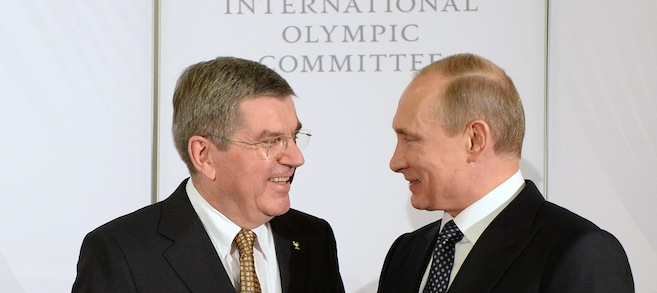Sochi: Meet the new boss
IOC head Thomas Bach defends the status quo
IOC President Thomas Bach and Russian President Vladimir Putin. (AP Photo/Andrej Isakovic, Pool)
Share

Back in 1976, Thomas Bach, the new president of the International Olympic Committee, won a gold medal in team foil fencing at the Montreal Games. And it seems that all these years later, he still remembers how to stick it in.
Presiding over his first Games since replacing Jacques Rogge last September, he would seem to have good reason to be worried. Terrorist threats. The international backlash against Russian President Vladimir Putin’s authoritarianism and his government’s anti-gay laws. Sochi’s general lack of preparedness, or give-a-rat’s-ass-ishness. Even the supposed cull of stray dogs.
But at press conference only hours before the Opening ceremony Friday, the 60-year-old German was the very model of confidence, parrying reporter’s pointed questions, and when the occasion presented itself, striking quickly to score points.
A U.S. TV journalist’s attempt to suggest that the threat facing the host city was somehow unprecedented in Olympic history was met with hollow laughter. “I’m really sorry,” said Bach, not looking that way in the least. “You cannot imagine how many threats there were to Games before. We had them in Sydney, in Athens, in Salt Lake City. You cannot single out these Games in this way.”
An British reporter who demanded to know if the IOC head was worried about Putin using the official Games kick-off for “propaganda purposes” was met with an exquisite backhand thrust. “The [Olympic] Charter is very clear: the President of the country can exactly say one sentence,” Bach noted. ” [Putin] will say this one sentence, as did all the heads of states before with the exception of one who violated, at the time, the Olympic Charter, and this was in Salt Lake City in 2002.” (When George W. Bush opened the Games “on behalf of a proud, determined and grateful nation” after an evening filled with American flag waving and tributes to the victims of 9/11.)
An inquiry about whether athletes will be able to voice their objections to Russia’s anti-gay stance was flicked away. “There is freedom of speech in press conferences where they can explain their true opinions,” said Bach. Then he charged down the piste and attacked. Far from being outraged, some athletes, he said, are relieved not to have to keep talking about the controversy. “They know that if the Olympic competitions or Olympic venues are becoming a political stage, that this is no sports competition any more.”
Bach is new to the job, but not the game. He was a founding member of the Athlete’s Commission at the beginning of the 1980s, and he’s been a full-fledged member of the IOC for more than 20 years. And now he finds himself in charge of a multi-billion dollar business—the organization has $932 million in cash reserves he mentioned in passing Friday—an overseeing a two-week spectacle that will be broadcast to more than 200 countries and territories and watched by billions.
Bach won election, and an eight-year mandate, by positioning himself as a cautious, reform-minded CEO, who will keep down the costs that put staging, and even bidding on an Olympics out of reach for many nations, and crack down on the drug cheats who threaten the whole enterprise’s viability. But anyone who was expecting the IOC to suddenly become a force for good under his leadership should probably give their head a shake. He is responsible for running the Games, he repeatedly stressed, not fixing the world’s problems.
And Bach may have a point. Demanding that athletes boycott competitions held in unfriendly places is protest by proxy. While Western leaders, like Barack Obama and Stephen Harper, who are staying away from these Games to show their displeasure with Putin don’t seem inclined to actions that might actually have a cost—or an effect—like trade sanctions.
Either way, the smart bet is that by Saturday, the world’s focus will have moved on to the medals. And all these inconvenient questions can be put aside until Rio, or Pyeongchang.
It’s just as Bach said: “The stage is set. The sun is shining.”
Let the Games begin.